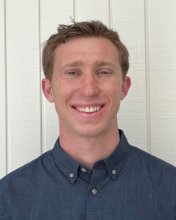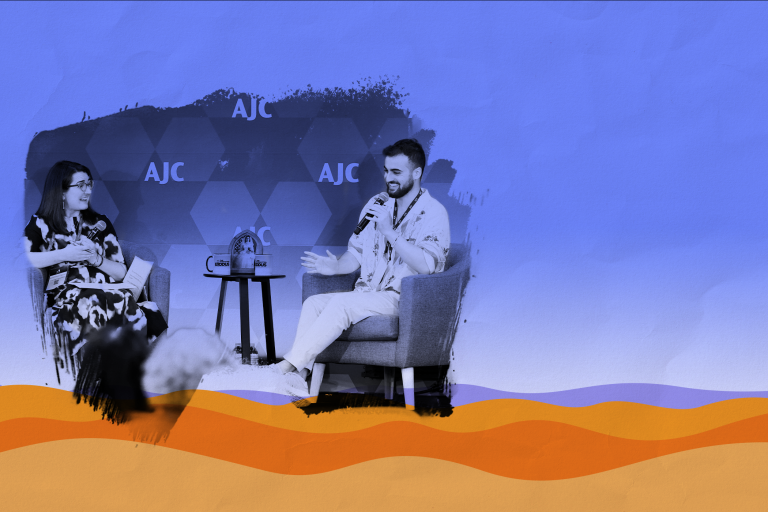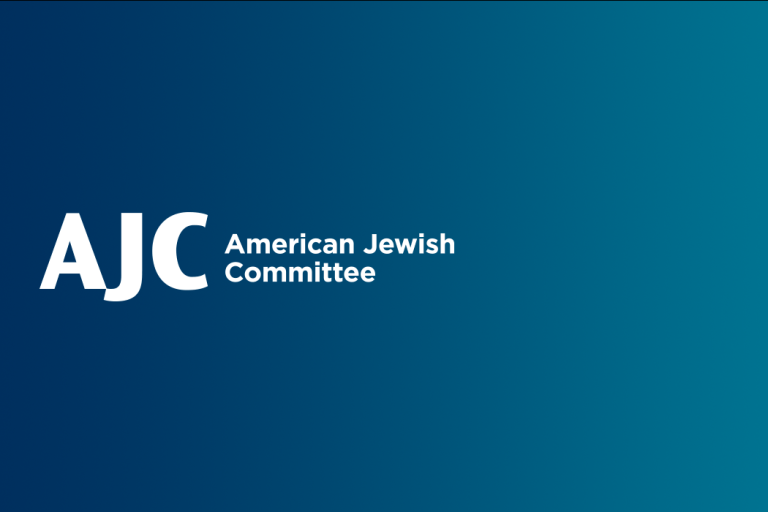July 19, 2022 — Los Angeles, CA

August 3, 2022 - Reflections on a Summer at AJC
While I’ve been told that time moves fast when you’re having fun, I wasn’t prepared for summer to fly by quite so quickly. It seems like just yesterday that I drafted a first blog post, outlining my Jewish story. And just like that, my time as a Goldman Fellow is coming to a close. Still, with AJC I have found a new lens not only for my Jewish identity, but my broader world outlook too. In further exploring my Jewish identity, I discovered a stronger understanding and appreciation for my role in the Jewish world.
At AJC, one of my most frequent projects was researching and reporting antisemitic incidents in Southern California. What most struck me wasn’t the virulence of the antisemitism (however, the frequency was disheartening), but rather the response to it. Whether it be in a newspaper, at a school playground, or on Twitter, it seemed that members of the public often became witnesses to this hate, as nearly every antisemitic incident I researched was flagged and confronted by a member of the Jewish community. Mainstream media outlets rarely reported these incidents, public leaders rarely spoke out, and Twitter users could care less. In other words, I quickly found that most anti-Jewish behavior was invisible to non-Jews.
At first, this phenomenon was frustrating and sad to observe. I was disappointed that Jews, already disproportionately victims of hate, are forced to fend for ourselves. I would ask myself, “Why do we have to be unilaterally responsible for policing antisemitism?” However, to better understand my frustrations, I only needed to look inward and reflect on my own experiences.
As mentioned in my first blog post, I grew up in a very non-Jewish community. While I was taught about the difficult history of the Jewish people, the lessons of antisemitism didn’t seem to apply to my personal experiences. This was because I did not perceive my Jewishness as important to my identity, and therefore did not feel antagonized by displays of antisemitism. I unknowingly shielded myself from modern manifestations of antisemitism. Subtle displays of ignorance did not register as red flags, and I overlooked problematic rhetoric from my peers. In short, I didn’t perceive antisemitism because I did not consider myself a target for anti-Jewish hate. How could I experience antisemitism if I didn’t consider my Jewishness important to me? I didn’t, not because the Jewish tropes and microaggressions didn’t exist, but because I dismissed them as inconsequential. For the first 18 years of my life, I was like most people – antisemitism was invisible to me.
When I began to embrace my Jewishness at college, I became cognizant of anti-Jewish tropes and anti-Israel microaggressions; however, I still didn’t fully understand the limited visibility of this antisemitic behavior. I thought others could see it too and could understand why I would feel uncomfortable in those moments. I felt like I didn’t need to speak out against this prejudice because it was clearly visible. For me, the silence in the room after a subtle antisemitic comment was a mutual understanding of the transgression. If I perceived the problematic nature of a remark, I assumed everyone else could too. Turns out, I was naïve. In my time at AJC, I realized that, like myself at 18, most do not recognize, let alone understand the implications of antisemitic comments. While many of us have confronted ignorance and microaggressions throughout our lives, others, like me, only became aware of these incidents after deciding to search for them. As I grew into my Jewish identity, I was still learning how to address moments of discomfort and how to manage my expectations of others. Self-reflection helped me understand the importance of identifying and combatting antisemitism.
At AJC, I gleaned a more nuanced awareness of what hate looks like, not just for the Jewish community, but other groups as well. More importantly, I have gained greater empathy for other stigmatized groups. Just as antisemitism can be elusive to the lens of non-Jews, hate can be universally invisible to everyone but the victim. I do not pretend to understand the challenges other groups face, but I now better understand how hate manifests and hides from the general population. Going forward, I will use my updated lens as a guide to inform how I interact with others and respond to hate. Whether that be intervening when I hear a problematic comment, educating my peers about modern manifestations of antisemitism, or navigating difficult inter-group conversations to embolden allyship, my time at AJC has provided me with important tools to confront offenders and support victims. As a recipient of antisemitism, I now have a nuanced perspective that enables me to not only challenge hate, but also join in solidarity with others through shared experiences. Whether I am a victim or bystander, I won’t remain stagnant when the room falls silent, but rather address misbehavior head on.
For someone who isn’t Jewish, concerns about antisemitism can be easily overlooked. This was true for me as well. While I can’t see all forms of hate, I know it exists, and that I have a responsibility to combat it through action and allyship. This summer, I learned what it means to be Jewish.
July 19, 2022 - A Part of the Family - AJC LA’s 77th Annual Family Reunion
I’m an introvert. That means I’m not a huge fan of talking to others, especially strangers. Yet somehow, I found myself as the greeter for AJC LA’s 77th Kaufman Family Annual Meeting. My job was to talk to people - elected officials, diplomats, successful lay leaders. Distinguished, important people. To put it lightly, I was quite nervous.
About thirty minutes before the event began, an AJC staff member asked me to stand outside the entrance and be friendly to the arriving guests. “Okay,” I thought to myself, “I don’t know how to do that.” Do I say hello? Do I introduce myself? Do I ask about them? What does a conversation with an elected official, diplomat, or member of the AJC family look like in such a formal setting? (Don’t worry, I do know how to be friendly. I was just overthinking… a lot). I was incredibly nervous as I saw the first guest approaching the stairs where I was stationed. However, the guest came right up to me and introduced herself as from the Canadian Consulate, and I did the same. “That wasn’t bad at all,” I thought, “and I just shook hands with a diplomat. That’s pretty cool.”
With each new guest, I became more comfortable and confident in myself. While I was still wary of being overly pushy or abrasive (and was probably awkward at a few moments) my nerves began to fade away. I quickly realized that I had a place here. Not only was I interested in meeting the high-profile guests, but I found that many were equally curious to learn about me as well: “Where are you from?”; “What’s school like?”; “How is Seattle?”; “What are your goals?”; “How do you like AJC?”; and my favorite, “You’re the Goldman Fellow? I read about you!” Yes, members of the AJC family, who had intimidated me just an hour earlier, already knew about me.
Despite the formal setting and my own nerves, my interactions with the guests became friendly and familiar – a handshake, introduction, some small talk. I found that, despite my initial apprehension, I already knew what to do. In my interactions with diplomats, I could draw upon the interpersonal skills that I had used many times before meeting new classmates at college, making connections at work, or introducing myself at social events. In other words, the friendly introduction and conversation did not change because I was interacting with a Consul General, U.S. Representative, or distinguished AJC lay leader. Despite feeling nervous about conversing in a high-profile, formal setting, I realized that I was tricking myself into feeling “imposter syndrome.” Once I settled in, my conversations were gracious and relaxed, and the number of times I thought to myself, “that was so cool”, after having a positive interaction with one of the distinguished guests, became too many to count.
After all the guests arrived, I observed the remainder of the event and series of speakers. What stood out to me most was the way AJC staff interacted with the guests. Many of the conversations were warm and bright, almost like re-connecting with old friends or close acquaintances. I overheard conversation topics about family, hobbies, life updates, and mutual interests. Between emphatic handshakes, friendly hugs, a caring hand on the shoulder, laughing, smiles, and an overall positive energy, the Annual Meeting did not feel like a formal advocacy event, but almost like a family reunion.
As the social activity died down, the formal program began. Nearly every speaker address expressed gratitude and plaudits to AJC and underscored our importance to advancing diplomacy. During his remarks, His Excellency Shaikh Abdullah Bin Rashid Al Khalifa, Ambassador of Bahrain to the United States, referred to AJC as a “friend.” I know, crazy cool, right? But at that moment, something clicked for me. I realized that my informal introductions as a greeter were not because of my “intern” status, and the familial friendliness throughout the event was not a strange circumstance. Rather, I realized that this camaraderie is how AJC pursues advocacy. While in many ways AJC builds formal diplomatic partnerships, very often those partnerships are genuine personal bonds. As I learned from observing the Annual Meeting’s conversations and speakers, AJC constructs strong interpersonal connections that create a respectful space for pursuing our advocacy. In other words, AJC establishes trust with our partners, enabling us to bridge cultural differences, navigate multiple perspectives, and facilitate productive conversations to combat antisemitism, advocate for Israel’s legitimacy and safety, and advance human rights.
Had I known about AJC’s style of advocacy before the Annual Meeting, I would not have been so nervous to interact with the distinguished guests. Still, I believe this experience was essential. Despite my introversion initially making me apprehensive, I soon realized that I had nothing to fear and no reason to feel intimidated, because I learned that effective advocacy starts with a handshake and a friendly hello. When AJC refers to its partners as part of “the AJC family,” we genuinely mean it. During the Annual Meeting, I felt part of the family too.
June 27, 2022 - Where you are Jewishly and career-wise? What you hope to get out of internship?
I have had a nonlinear path to my current role as a Goldman Fellow at AJC. In fact, I didn’t always consider my Jewishness as important to my identity. Yes, I read the four questions every year at my grandmother’s Passover, and I lit the candles on my menorah for Hanukkah, but I never felt connected to these traditions. Growing up in a secular household in non-Jewish community, I was rarely exposed to my Jewish heritage. My friends growing up had no idea I was Jewish, and when I told them I was going to Israel for Birthright after graduating high school in 2019, I received an answer along the lines of: “what? why?”. “It’s a free trip” I would reply, usually with a shrug. At that point, being Jewish to me was merely a few yearly traditions and a free trip to Israel.
My Jewish self-perception changed after Birthright. It was a strange feeling being surrounded by Jews. The yearly traditions that were once inconsequential became ways to connect with my Jewish peers; I experienced my first taste of a Jewish community. More importantly, visiting Israel broadened my perspective and helped me understand the importance of my Jewish identity and my place within the Jewish world. This realization occurred at the Yad Vashem Holocaust Memorial Museum, where I found a distant relative in the victims database. While I was aware that I had ancestors killed in the Shoah, I hadn’t personally resonated with this fact until Yad Vashem. However, something clicked at that moment. I then understood the collective experience of oppression and survival that defines the Jewish identity – myself included - and why Israel is so important to the Jewish people. I realized the country is a bastion of security should the world turn against Jews again. After experiencing Yad Vashem and Birthright as a whole, I wanted to understand my place within the Jewish world and my relationship with Israel.
As I entered college at the University of Washington, I wanted to use my coursework to explore my Jewishness. I self-selected topics relevant to my Jewish interests for independent research projects, such as a history essay detailing the racialization of American Jews, or a political science paper that tested diversionary war theory as an explanation for the Yom Kippur War. Through these academic papers, I have learned about Jewish history, my Jewish identity, and my relationship to Israel. This most recent Spring, I wrote research papers about the United States denial of Jewish refugees during World War II, as well the 21st century Israeli-Palestinian conflict within the lens of Jerusalem’s urban development. In addition to academics, I also dedicated time outside school to learning about my Jewish heritage. I took a DNA test (turns out I am 100% Ashkenazi Jewish), I spoke to family about our history, and I tracked my lineage on various genealogy databases. Through my research, I learned about the geographic roots of my family ancestry and my place within the Jewish diaspora. While I once dismissed my Jewishness as an inconsequential piece of my identity, my perspective changed as I explored my heritage throughout college. I came to understand and appreciate my place within the Jewish diaspora and applied the lessons from Jewish history to my own world view.
While college was fruitful for my exploration into my Jewish identity, I was also determining my career trajectory. Entering college, I was incredibly interested in domestic politics – I set a goal to work on Capitol Hill. However, after interning for a Seattle-based campaign consulting firm and California state senator, I became disenchanted with the Hill. For me, electoral politics seemed monotonous and slow-moving, highly polarized, and equally frustrating as it was rewarding. At the same time, my academic focus shifted away from domestic politics as I found a new passion for international relations. I became fascinated by the dynamics of international politics – how state actors, international institutions, and NGOs all collaborate within the international system. Likewise, I declared for the “international security” specialization within my school’s political science department and began taking political science classes almost exclusively in international relations.
My career plans shifted in conjunction with my academic interest in international relations. Currently, I plan to attend law school and specialize in international law. From there, I hope to involve myself with international diplomacy and/or nonprofit work. International politics is such a broad field that I am keeping an open mind about my professional goals. As I learned from my pivot away from domestic politics, my career trajectory can easily change.
Today, I find myself in a perfect professional situation. AJC intersects my interest in international relations with my yearning to explore my Jewish identity. As a Goldman Fellow, I am excited to learn about the inner workings of international diplomacy and the processes of domestic political advocacy. With nonprofit work a potential destination after law school, I am eager to gain experience and insight into AJC’s broad umbrella of advocacy efforts. Most important, my fellowship offers a fantastic opportunity to find my place within the Jewish world. Not only can I gain a better understanding of Israel’s position in international politics through AJC’s diplomacy, but I can also obtain a more nuanced awareness of my Jewish identity and my role in the Jewish world. Whether that be in Los Angeles, the United States, or the international political arena, working at AJC can broaden my Jewish lens and help me further resonate with and combat challenges pertinent to the Jewish world. Finally, AJC will provide me an outlet to substantially broaden my Jewish community, connecting me with like minded professionals who are keen to engage with their Jewishness in order to progress human rights and ameliorate the plights of the Jewish world.
After graduating high school, I traveled to Israel viewing my Jewishness as inconsequential to my identity. Today, I embrace it. I begin my fellowship with AJC eager to help advocate for Jewish interests and human rights, to enlighten my career goals in learning about international diplomacy and nonprofit work, and most importantly, to continue the journey I set about three years ago to find my role within the Jewish world.


